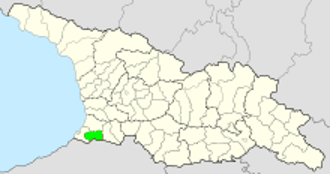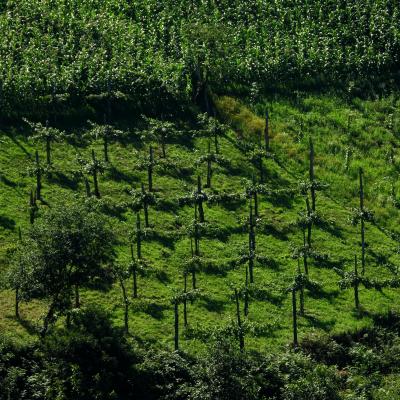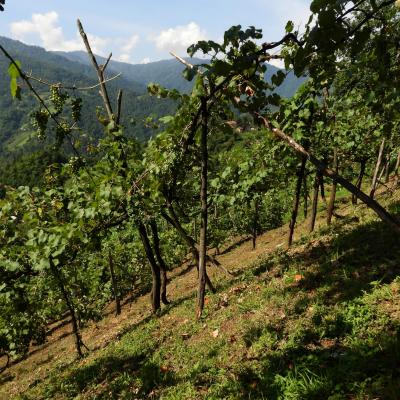Chkhaveri Vineyards Against Land Erosion in Keda Municipality, Georgia

Summary
This solution, which has been implemented by the Caucasian Environmental Non-Government Organizations Network (CENN) and supported by USAID, aimed to reduce soil erosion in the Keda Municipality by planting vineyards of Chkhaveri grapes.
The Keda municipality is located in Mountainous (or Upper) Achara, in southwestern Georgia. It is particularly exposed to flash floods, mudflows and landslides. This is not only due to its topography and climate, but also to human activities conducted in the area. Widespread use of annual crops on the slopes has led to increased soil erosion and risk of landslides. This is especially the case for those crops requiring frequent watering, and crops with shallow or otherwise limited root systems, such as corn, which do not help to bind and the soil at depth.
These natural hazards are expected to become more frequent in the future due to warmer temperatures and wetter climate conditions.

To mitigate present and future risks, the Caucasian Environmental Non-Government Organizations Network (CENN) supported the development of a plantation of Chkhaveri grapevines in Merisi village. With their developed perennial root system anchored in the soil, these grapevines help combat soil erosion, stabilize sloping ground, and improve soil quality. The cultivation and use of Chkhaveri grapes for winemaking also provides a source of income for the population and contributes to reviving viticulture in the region.
‘Our village is located on the mountain slopes; hence, landslides and avalanches are usual events here. In 2012, experts explained to us that our agricultural practices were contributing to land degradation and suggested we rather plant Chkhaveri grapevines to produce wine or sell the grapes. Chkhaveri is a grape native to my village that was abandoned many years ago when Georgian wine was not famous internationally. Now, demand for Chkhaveri is high, viticulture is profitable and the soil of my land improved. It seems experts were right.’ Aslan Gogolishvili, a project beneficiary
The activities detailed here were carried out during January 1, 2012 – April 1, 2012 as part of the Strengthening Local Capacity and Developing Structured Dialogue for Climate Change Adaptation (CCA), Natural Disaster Risk Reduction (DRR) and Post-Conflict Environmental Rehabilitation in Georgia project. The overall goal of this project was to develop flexible and resilient societies and economies in rural areas of Georgia capable of coping with the impacts of current climate variability and future climate change.
This solution was implemented in collaboration with the Wine Club and Vineyard Fund, together with the Adjara government and local government of Keda municipality.

Overview
- Location:
- Implementation sites:
-
- Single country
- Single location
- Mountain region:
-
Caucasus Mountain
- Province:
-
- Adjara, Keda Municipality
- Site locations:
-
Merisi village
- Solution scale:
- Ecosystem type(s):
- Solution type(s):
- Sector(s):
- Climate impact(s) addressed:
- Climate impact time-scale(s):
- Main benefit associated with the solution:
- Other benefit(s) associated with the solution implementation:
-
- Reduction of the risk of landslides
- Co-benefit(s) associated with the solution implementation:
- Other co-benefits(s) associated with the solution implementation:
-
- Support eco-tourism development
- Implementation timeline:
-
- 2012 - 2012
Solution details
Main beneficiaries & outcomes
Local farmers are the main direct beneficiaries, and wine-producing businesses are indirect beneficiaries. Other inhabitants in the village may also benefit from the development of eco-tourism enabled by the revival of viticulture in the region.
This solution has contributed to the following:
- Reduction of soil erosion and risk of landslides;
- Generation of a new and higher income stream for farmers, as Chkhaveri wine is a high-value product that is in high demand domestically and internationally; and
- Promotion of eco-tourism development and wine-based tourism in the region.
Since the Chkhaveri variety of wine is unique to the Adjara region, this solution has also served to highlight the cultural value and local knowledge of Adjara region in Georgia and internationally.

Planning and implementation
On March 20, 2012, the local coordinator of CENN in Adjara region had a meeting in the village of Dandalo to identify nurseries to supply the saplings for vineyards. The successful cultivation of Chkhaveri vineyards requires special care and knowledge. The slopes have to be sunny and the lime content of the soil can affect the grapes. For this reason it was decided that the population were to be given special training. The initiative was supported by the Governor of Keda municipality, who acknowledged the significance of Chkhaveri vineyards and indicated that the pilot project would be beneficial not only for prevention of natural disaster but also development of the wine culture.
On March 29, 2012, a meeting was held with Adjara Autonomous Republic Minister of Agriculture and Chief of Geology Service. During this meeting the Minister of Agriculture granted the help of a specialist from the ministry to help the pilot project in obtaining the saplings of Chkhaveri and in training the local population about the ways of taking care of the vineyard.
During March 29-31, 2012, an expedition was arranged to Keda municipality to select the locations for planting Chkhaveri vineyards with advice from agriculture, geology and vineyards experts. Representatives from CENN and Wine Club also participated in the expedition. The Chief of the Geology Service recommended the villages that would be the most suitable for planting Chkhaveri grapes. During the expedition, CENN and Wine Club representatives visited the villages of Keda municipality that have the oldest traditions of wine making and held meetings with local population. The slopes with identified erosion problems were visited to select the ones suitable for vineyards.
Finally, Merisi community was selected as target area. There are 4 villages in this community. 40 families from these villages were provided with up to 1000 saplings of Chkhaveri. The population provided with special training in the cultivation of Chkhaveri grapes and received small printed brochures on how to take care of Chkhaveri grapevines.
The planting activities were undertaken during May 28 –June 2, 2012. This week is marked as Tourism Week and besides planting some other activities were planned together with the Adjara government to highlight this pilot project.
The project included climate risk awareness training for the farmers to help them better understand how natural and human factors impact agriculture practices. Some of the local specialists also offered to give free consultations to other villagers interested in planting grapevines in order to increase the surface area used for grapevines, and thereby the total slope area stabilized using this approach.
After project completion, the Wine Club pursued its consulting and monitoring activities to ensure the viability of the project.
This pilot project was also incorporated in Adjara development plan.
Finance
The project was implemented with support from USAID.
Innovation
This project reinvigorated the historical regional practice of viticulture, and applied this to address multiple concerns: soil erosion, slope stabilization, soil health, and livelihoods and income generation.
Performance evaluation
No performance evaluation has been undertaken.
Long term project sustainability and maintenance
Communities are continuing the wine growing practice in the Merisi village. Chkhaveri wine continues to be in demand, providing a financial incentive to continue viticulture in the region.
Capacities for design and implementation
Knowledge
The successful cultivation of Chkhaveri vineyards requires special care and knowledge. For this reason the population were given special training, including supporting documentation, and some of the local specialists also offered to give free consultations to other villagers interested in planting grapevines.
Political / Legal
The initiative was supported by the Governor of Keda municipality, who acknowledged the significance of Chkhaveri vineyards and indicated that the pilot project would be beneficial not only for prevention of natural disaster but also development of the wine culture. This pilot project was also incorporated in Adjara development plan.
Institutional
The solution was initiated by the NGO CENN and implemented with community involvement in the village Merisi. Support of local and regional government, the Adjara Autonomous Republic Minister of Agriculture and Chief of Geology Service, played an important role in identifying appropriate locations for the planting of Chkhaveri vineyards, obtaining grapevine saplings, and in training the local population about the ways of taking care of the vineyard.
Outlook & Scalability
Transformation and future outlook
The land erosion was reduced by replacing annual crop growing practice with perennial crops. The soil has become healthier and more resistant to climate-induced landslides. The local community have a new source of income, and produce a high-value product – Chkhaveri wine – that is unique to the region. The wine and vineyards are attracting additional tourists to the area, further boosting the local economy.
Potential for upscaling and replication
Chkhaveri grape is unique for the Adjara and adjacent Guria region, and there is a hypothesis that the Chkhaveri grape might not be adaptable for different climatic or soil areas. However, replacing annual crops with perennial crops by selecting local specific grapes is applicable anywhere in Georgia and elsewhere. Part of the solution may also lay in the local knowledge and ancestral practices that were adapted to the local landscape at some point in the past.
- Strengthening Local Capacity and Developing Structured Dialogue... In Georgia: Quarterly Report X (Jan-Apr 2012)
- Mountain Adaptation Outlook Series: Outlook on Climate Change Adaptation in the South Caucasus Mountains (2015)
- Women in bees-ness in Georgia
- Seizing local opportunities in Armenia
- Flourishing Dams in Georgia





Comments
There is no contentYou must be logged in to reply.